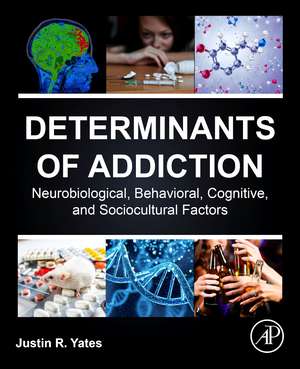Determinants of Addiction: Neurobiological, Behavioral, Cognitive, and Sociocultural Factors
Autor Justin R. Yatesen Limba Engleză Paperback – 12 dec 2022
- Explores differentiating factors that influence why people develop a substance use disorder
- Introduces the cellular and anatomical pathways of addiction
- Identifies genes implicated in substance use disorders
- Reviews role of conditioning in the development of substance use disorders
- Includes personality, sex/gender and sociocultural factors in addiction
- Discusses the influence of peers and stress on addiction process
Preț: 714.21 lei
Preț vechi: 886.36 lei
-19% Nou
Puncte Express: 1071
Preț estimativ în valută:
136.66€ • 142.70$ • 112.85£
136.66€ • 142.70$ • 112.85£
Carte tipărită la comandă
Livrare economică 08-22 aprilie
Preluare comenzi: 021 569.72.76
Specificații
ISBN-13: 9780323905787
ISBN-10: 0323905781
Pagini: 598
Ilustrații: 35 illustrations (10 in full color)
Dimensiuni: 191 x 235 x 35 mm
Greutate: 1.2 kg
Editura: ELSEVIER SCIENCE
ISBN-10: 0323905781
Pagini: 598
Ilustrații: 35 illustrations (10 in full color)
Dimensiuni: 191 x 235 x 35 mm
Greutate: 1.2 kg
Editura: ELSEVIER SCIENCE
Cuprins
I: Prologue
1. Introduction to addiction: Substance use disorders
II: Neurobiological mechanisms of addiction
2. Pharmacological actions of commonly used drugs
3. Neuroanatomical and neurochemical substrates of addiction
4. Molecular and cellular mechanisms of addiction
III: Behavioral and cognitive mechanisms of addiction
5. Learning mechanisms of addiction: operant conditioning
6. Learning mechanisms of addiction: Pavlovian conditioning
7. Attentional and memory processes underlying addiction
8. Maladaptive decision making and addiction
IV: Individual and sociocultural factors linked to addiction
9. Individual differences in addiction: focus on personality traits
10. Social and sociocultural factors associated with addiction
11. Stress and addiction
12. Gender and sex differences in addiction
V: Epilogue
13. Beyond substance use disorders:Behavioral addictions
1. Introduction to addiction: Substance use disorders
II: Neurobiological mechanisms of addiction
2. Pharmacological actions of commonly used drugs
3. Neuroanatomical and neurochemical substrates of addiction
4. Molecular and cellular mechanisms of addiction
III: Behavioral and cognitive mechanisms of addiction
5. Learning mechanisms of addiction: operant conditioning
6. Learning mechanisms of addiction: Pavlovian conditioning
7. Attentional and memory processes underlying addiction
8. Maladaptive decision making and addiction
IV: Individual and sociocultural factors linked to addiction
9. Individual differences in addiction: focus on personality traits
10. Social and sociocultural factors associated with addiction
11. Stress and addiction
12. Gender and sex differences in addiction
V: Epilogue
13. Beyond substance use disorders:Behavioral addictions
Recenzii
"The textbook by Yates presents a nice arrangement and presentation of the different levels of analysis used to define the important field of addiction, including biological, psychological and sociological views. Each chapter is a self-contained contribution on a different topic, each with an introductory thought, learning objectives and a self-test of progress. Students will like this organization. In addition, faculty will like the scholarly coverage of each topic that contains an extraordinary number of classic and recent citations. This is excellent contribution that will meet the need of courses offered in psychology, neuroscience and health science." -- Dr. Michael T. Bardo, Department of Psychology, University of Kentucky
"One of the most comprehensive textbooks available for understanding drug-seeking, drug-taking, and substance use disorders. What we know at several levels – molecular, neural, behavioral, sociocultural – is concisely summarized in ways that students will find approachable and compelling.In Yates’ text, students will find answers to their common questions (e.g., why are some people more likely to misuse drugs than others) and will find new questions to motivate their continued search for the determinants of human addiction." -- Gregory J. Madden, Ph.D., Department of Psychology, Utah State University
"One of the most comprehensive textbooks available for understanding drug-seeking, drug-taking, and substance use disorders. What we know at several levels – molecular, neural, behavioral, sociocultural – is concisely summarized in ways that students will find approachable and compelling.In Yates’ text, students will find answers to their common questions (e.g., why are some people more likely to misuse drugs than others) and will find new questions to motivate their continued search for the determinants of human addiction." -- Gregory J. Madden, Ph.D., Department of Psychology, Utah State University
